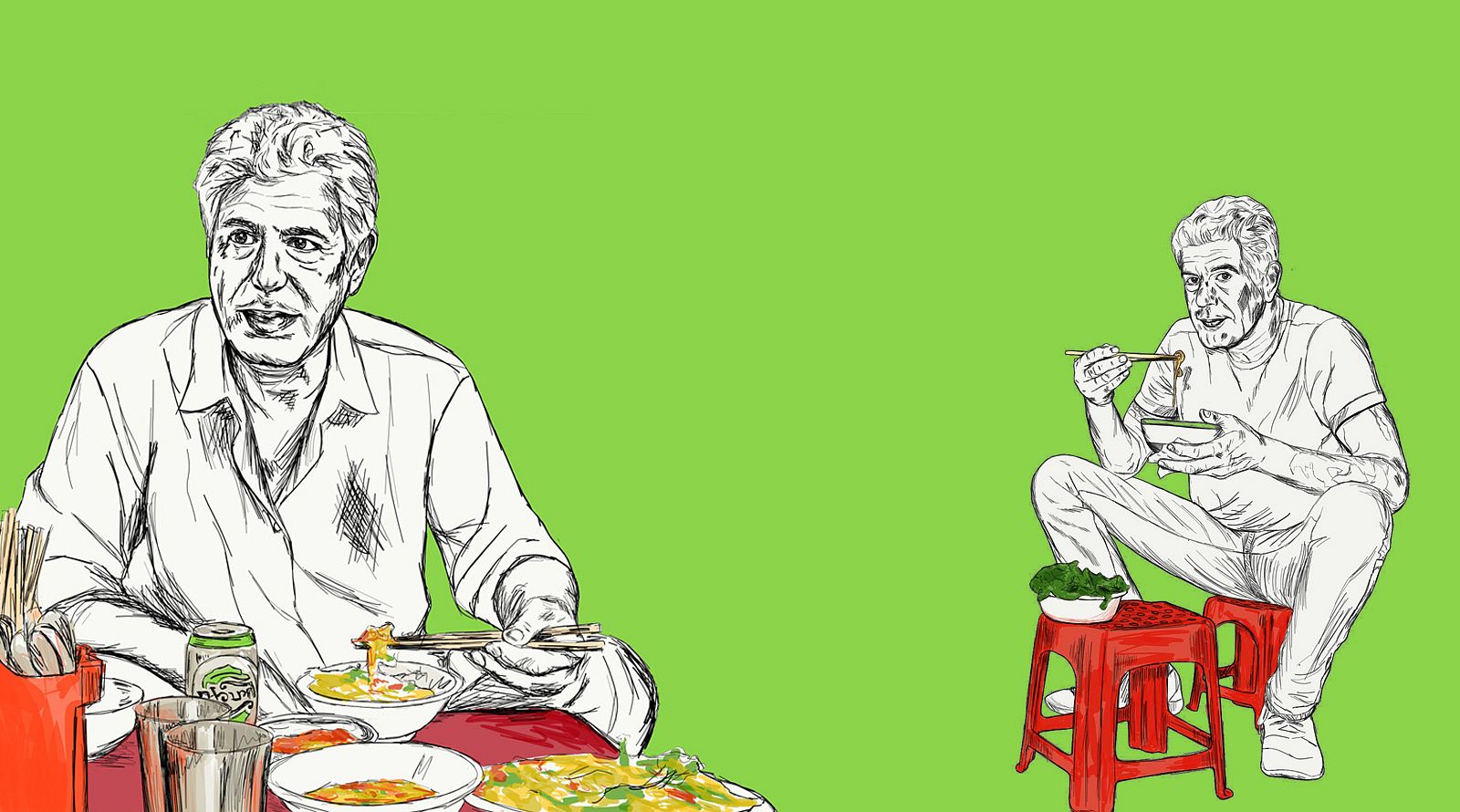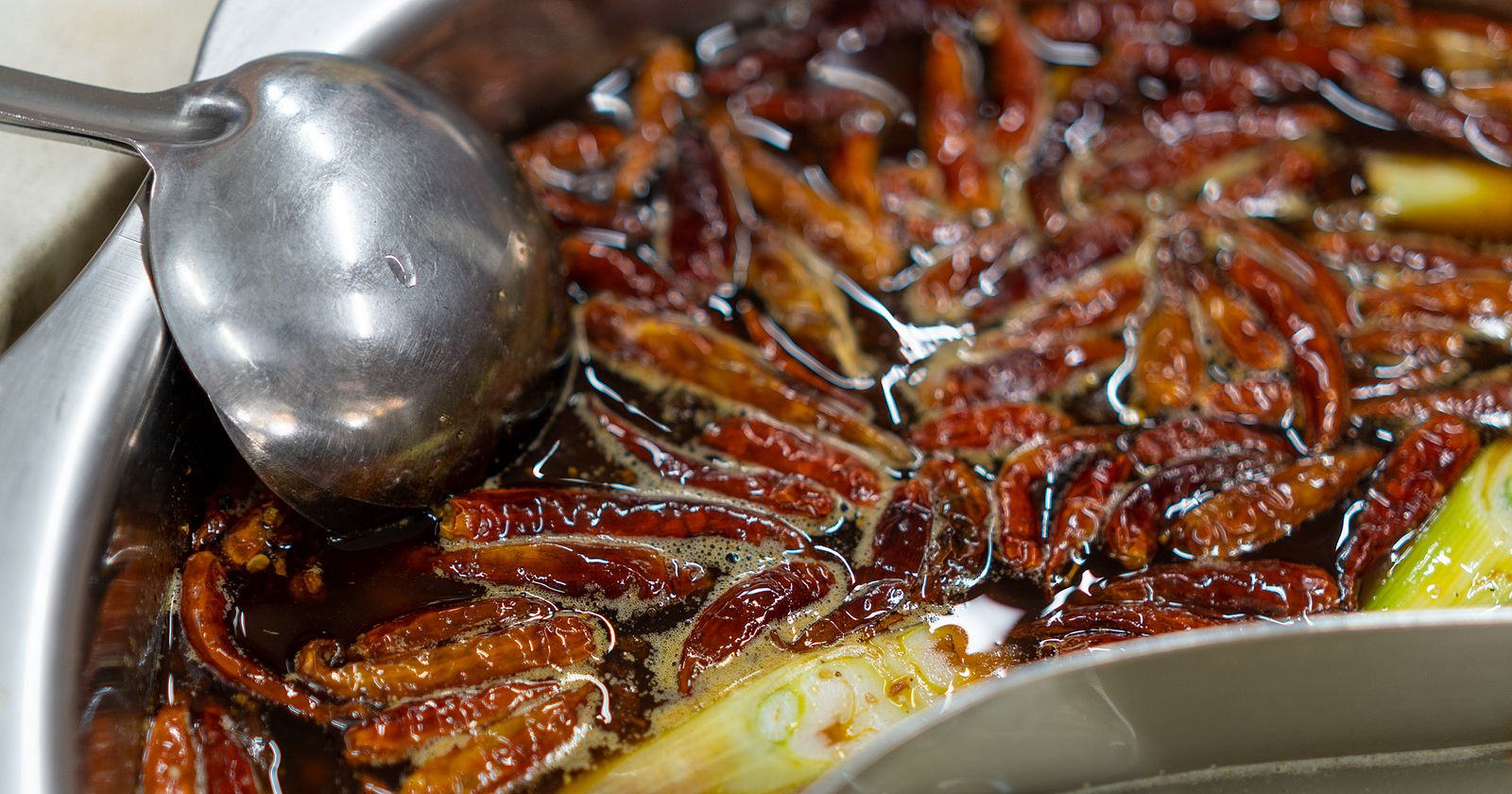Anthony Bourdain meant many things to many people.
To those that worked with him, he was a unique storyteller, a skilled conversationalist who had the ability to talk with anyone and everyone. He traveled adventurously and extensively, inspiring people from around the world to do similarly, proving to be an unashamedly authentic voice.
But on June 8, 2018, the world lost that voice.
But two years on from Bourdain’s sudden passing, his memory lives on in the people that knew and loved him, those that worked alongside him and the hundreds and thousands enthralled and inspired by him.
In Southeast Asia, one of Bourdain’s self-professed favorite regions, his culinary legacy can still be seen today. Starting with the release of his 2001 New York Times best-seller A Cook’s Tour, its eponymous travel and food show spin-off, followed by No Reservations and finally Parts Unknown, over the course of 17 years Bourdain visited and re-visited the likes of Vietnam and Cambodia, championing local chefs and delicacies.
“He was born one day before me, so we were from the same generation,” said Philip Lajaunie, a friend of Bourdain’s and his once-boss at the now-closed Brasserie Les Halles, in New York. “I felt comfortable with him.”

Anthony Bourdain and Philip Lajaunie at Bagan in Myanmar. Photo provided by Philip Lajaunie.
Now immortalized within the pages of Kitchen Confidential, Bourdain’s 2000 best-selling expose of the restaurant industry that propelled him to stardom, it was Lajaunie who sent and accompanied Bourdain on his first trip to East Asia — a working trip to Japan’s capital, Tokyo.
“Before the flight, he said to me, ‘Here, let me give you these books I wrote,’” remembered Lajaunie. “He gave me these two hardback novels with his name on them and I was thoroughly impressed.”
Bourdain would publish a piece on the trip, 'A Mission to Tokyo,' and attributed that trip and Lajaunie to introducing him to the culinary delights of Asia.
“We had a great time in Tokyo, and I was happy that I was with someone who had this huge breadth of knowledge on literature, cuisine, movies — he was a thinker,” said Lajaunie.
Bourdain would often cite Tokyo as one of his favorite cities and, it was soon after this trip that he would publish his article 'Don’t Eat Before Reading This' in The New Yorker, which would become the foundation for Kitchen Confidential.
“He wrote Kitchen Confidential, it got published and that was that,” said Lajaunie. “I would see him at work on a Tuesday, ask him how his weekend was, and he’d reply — ‘It was great, I was in London promoting the book!’”
In a television career spanning 16 years, starting with A Cook’s Tour and finishing with CNN’s Anthony Bourdain: Parts Unknown, Bourdain traversed the globe. Lajauine appeared with the host in one of the first episodes of his television career, in Cambodia. “I saw him happy as a kid there, almost out of character,” said Lajaunie.
In Siem Reap for A Cook’s Tour in 2000, Lajaunie remembered renting out a boat to visit the floating villages. “It was dry season, so there actually wasn’t enough water,” said Lajaunie. “Anthony jumped into the water and he was pushing and pulling this boat out of the mud — and for hours, I’ve never seen him happier. You could see it in his face, through his words and his body language.”
Lajaunie also joined Bourdain in Myanmar in the first episode of Parts Unknown in 2013, a show that Lajaunie thinks was Bourdain’s best work. “Parts Unknown was inspiring, it was fun, and you learned something new,” he said. “Anthony would talk about politics, culture, war and peace — in places ranging from West Virginia to Vietnam.”
Bourdain’s voice has endured from the first page of Kitchen Confidential to the last episode of 'Parts Unknown' in 2018, and Lajaunie believes it is what made his friend stand apart. “He was one of the first in the food industry to talk about the realities of it,” said Lajaunie. “People at first would say, ‘Who is this guy!’ This was a guy who was humble enough to be honest and talk about the realities that people faced.”
Lajaunie was biking on the Ho Chi Minh Highway in Vietnam, a country that both he and Bourdain were incredibly fond of, when he heard word of his friend’s passing. He has since relocated to Hanoi, in part inspired by Bourdain’s message and their shared love of the country. “Vietnam was always the place,” said Lajaunie. “Tony and I had this little dream, that when things quietened down, it would be extraordinary to move over for a few years. We experienced happiness and joyfulness in Southeast Asia.”

A mural depicting Bourdain by Artist Jonas Never in Santa Monica, California. Photo by Eugene Garcia/EPA-EFE.
Anthony Bourdain inspired, and in Southeast Asia, two years after his passing, his influence can still be seen across the region.
Htet Myet Oo is 30 years old and lives in Yangon, Myanmar. He is the managing director of the RTH Group, which runs eight restaurant and café outlets in the country, the most famous of which is the popular Rangoon Tea House.
“Anthony Bourdain was one of the main reasons I got into the restaurant business,” Htet said. “I think any rebellious adolescent listening to him will always gravitate towards his ideologies.”
A large part of Htet’s upbringing was in the United Kingdom, and he said Bourdain’s celebration of differences motivated him to embrace his background and culture.
“I spent most of my childhood boxed into a culture I wasn’t sure I fit into, and Anthony inspired me to believe that creativity is not creating something that looks nice in the eyes of others, but actually in spite of others,” said Htet. “Over the years, his episodes in Asia have further inspired me to get notoriety for our [Burmese] cuisine and our culture.”
Today, Rangoon Tea House is six years old and has grown into a popular Yangon haunt. Htet wanted the eatery to not just sell tea, but to also tell the story of the tea shop — of a meeting point of cultures, sounds, smell and history: “I’ve always believed not only in the power of food, but the power of storytelling.”
Bourdain’s own storytelling ability was bolstered by his ability to understand people from different walks of life.
“He always found the commonalities between people, often over a bowl of noodles,” said Matt Walsh. “He knew that the food ingredients were different across the world, but that the experience of breaking bread together unites people.”
One of Bourdain’s earliest local producers, who worked on episodes based in China, Laos, Cambodia and Hong Kong, Walsh said the trait synonymous with Bourdain was authenticity. “The Tony that you saw on camera is the Tony that you would see off it,” he said. “You always got the real deal.”
With the COVID-19 pandemic shutting borders between nations and division erupting across the world, Bourdain’s ethos is as acute as ever. “He understood how people lived and was interested in showing their stories to the world, I think, with the intention of making the world a more understanding, compassionate place,” said Walsh.
Bourdain also had a knack for sparking a curiosity among those less traveled. Chris Bradshaw, a former union communications officer in British Columbia, Canada and a member of the ‘Anthony Bourdain Appreciation Society’ Facebook group, is one such example.
He was motivated by Bourdain to seek out the places in his television shows. “Before I turned 40, I was probably the least ‘travel person’ that I knew,” Bradshaw said. “I was inspired a lot by his shows — which took you to places you’d never have thought of going to.”
One of Bradshaw’s most recent travels was a two-week trip to Vietnam. “When that Vietnam episode with Barack Obama came on, we were watching it and we thought, ‘We’ve got to go to Vietnam’,” said Bradshaw. During their trip, they managed to visit Hanoi’s now-famous Bún Chả Hương Liên, where Bourdain and then-president Obama sat on low stools, drank beer and tucked into bún chả.

Former President Barack Obama and Bourdain dine in Hanoi. Photo by Pete Souza/The White House.
“The table they dined at is encased in glass and there’s pictures of them up on the wall, and of course I had to take photos,” remembered Bradshaw. “They had on the menu the ‘Obama Combo,’ which was the order that Anthony and Obama had in 2018.”
Naughty Nuri’s Warung is a popular Balinese group of restaurants, founded by Isnuri Suryatmi and her late husband, Brian Aldinger, in Ubud.
“He scribbled down in the guestbook that our martinis were the best he’s ever had outside of Manhattan,” said Naughty Nuri’s licensing manager, Nari Wedding. “But we think someone has walked off with it, because we haven’t been able to find it — we’ve looked everywhere!”
Bourdain visited Ubud in 2006 for No Reservations, where he filmed and dined at Ibu Oka, a famed babi guling (roast pig) restaurant.
“We heard he was asking where in Ubud to go for a drink with his team after filming had finished,” Nari and her husband Ian remembered of the night. “Someone said to him, ‘Try out Naughty Nuri’s, they do a great New York martini there!’”
Nari and Ian remember the production team relaxing at one table, and Bourdain and Aldinger immersed in conversation and martinis at another. “They spent the whole night together drinking martinis,” said Ian. “They had a whale of a time!”
Nari remembers Bourdain and the production team being very friendly during the course of the evening, and said word about the martinis has spread. “He was a very friendly man, made a lot of jokes — we were really happy that we could host him and his team,” said Nari. “We now get people who come in and say, ‘I have to try one of your martinis that Anthony Bourdain talked about!’”

A customer at Bun Cha Huong Lien in Hanoi. Photo by Nhac Nguyen/AFP.
It would be in Bali, 12 years later, that Bourdain would film one of his final culinary excursions before passing away.
“We were the final full episode that was shot,” remembered Joe Yaggi. The Indonesia-based production manager of Jungle Run Productions was the local producer for the episode on the 2018 season of Parts Unknown, which would prove to be the final before Bourdain’s death.
“Unlike other episodes, he sadly didn’t have the chance to do the voice-over for the Indonesia episode, so that changed everything,” Yaggi said.
Bourdain’s skill as an interviewer is what Yaggi remembers from his time on the shoot. “He’s probably one of the best interviewers in the world, he could get amazing stories out of people,” he remembered. “That driving inquisitiveness, that desire to understand people, giving them the ability to tell their story, was really amazing.”
Yaggi worked with Bourdain and the Parts Unknown team, with filming taking place in Jakarta and finishing in Bali, with a funeral on one of the island’s famed beaches – with hindsight, perhaps a poignant omen of events to come.
“This episode culminated in an intense, wild Balinese funeral ceremony, and in the last scene, the Balinese send the ashes of the deceased out to sea in a young coconut,” remembered Yaggi. “It made the hairs stand up on the back of your neck.”
Bourdain didn’t finish production of the Indonesia episode, among others in the final series of Parts Unknown, but his body of work remains, and his memory endures. As the episode ends, the sun sets and the ashes drift off to sea, and Bourdain’s voice can be heard: “All stories should end on a beach, all good ones anyway…Why should this one be any different?”
This article was originally published by Southeast Asia Globe.
















